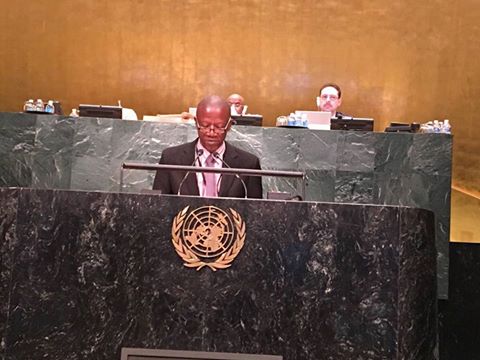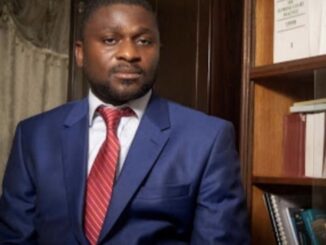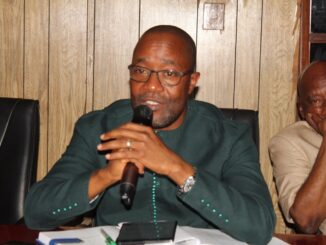
Statement by DR. Mohamed Gibril Sesay, Minister of State 1 – Ministry of Foreign Affairs & International Cooperation on New Partnership for Africa’s Development (NEPAD): Progress in Implementation and International Support – Causes of Conflict and the Promotion of Durable Peace and Sustainable Development in Africa, and Decade to Roll Back Malaria in Developing Countries Particularly in Africa.
14th October 2016
Mr. President,
The Sierra Leone delegation thanks the Secretary-General for his Reports on the agenda item of this debate, and also extends appreciation to the organizers of this event. My delegation aligns itself with the statements delivered by the distinguished representatives of the Kingdom of Thailand and Niger on behalf of the Group of 77 and China and the African Group respectively.
Eradicating poverty in all its forms and dimensions is the greatest global challenge and an indispensable requirement for sustainable development. My delegation supports poverty eradication as the overarching objective of the Post-2015 Development Agenda.
But to achieve our goal, fast tracking action is crucial. Poverty induces lots of sufffering amongst people. It is our obligation to end these situations of suffering quickly. Talking is not enough. Action that gets as many resources and capacities to the poor is a moral obligation, and we must not allow these resources and capacities to be clogged in the channels.
We must also ensure stability and peace as crucial for achieving our worthy development goals. Poverty is a form of instability. It is instability in the lives of the poor, it is instability and suffering in the lives of women and children, and it is instability that moves up to engulf whole societies. This is so because it makes it easy for its weaponization and misappropriation to inflict greater harm and insecurity on a society.
We believe that the MDGs ensured a most energetic anti-poverty push in human history. However, though Africa had fast growing economies when the MDGs were being implemented, the continent lags behind in poverty reduction rates, food security, maternal and infant mortality, fragility, environmental degradation, gender inequality and youth unemployment. This is why the implementation of the Sustainable Development Goals should ensure a re-doubling of actions to achieve the unfulfilled yearnings in the MDGs.
Sierra Leone had a weak start with the MDGs in 2000, emerging from a brutal civil war at the time. We had a mixed basket of outcomes. But this time around, we are determined to move on fast with our actions. This is why we also see the SDGs as a recast of the country’s development framework; our Agenda for Prosperity and the SDGs are profoundly aligned. Sierra Leone was one of six African states among the twenty-two countries that volunteered for, and were reviewed during the ECOSOC High-Level Political Forum in July this year. We shared our perspective as to how we intend to implement the SDGs nationally, the challenges we envisage moving forward and how we wish to overcome them.
Mr. President,
As we commence the second year of implementing the SDGs, it is imperative that we ensure stateness. We must ensure stateness not only in terms of the central state, but the local state and the state’s service delivery functions. In Sierra Leone, recovering state functions were emphasized after The Civil War in the 1990s. Our current Post Ebola Recovery Programme prioritizes rebuilding functionalities of government’s service delivery mechanisms in the health, agriculture, education and other sectors.
The Government of Sierra Leone is determined and committed to further improve peace and security. We have moved from a country on the agenda of the Security Council to a nation that is a storehouse of lessons on how to successfully move away from war to peace and development. As a signatory and pilot country to the New Deal for International Engagement in Fragile States, we pay great attention to domesticating SDG 16.
Mr President, our Government is keen on intensifying the fight against corruption, promoting good governance, accountability and transparency. We also urge accountability and transparency in the institutions and vehicles of support to African countries.
As we move on with implementing the SDGs we must promote religious tolerance and co-existence as pillars of stability and development. We have all seen how entrepreneurs of conflict misappropriate the substance and symbolisms of religion. We must engage religious leaders and adherents, we must build on resources for tolerance and peace that exist within religious traditions to promote stability, peace and security in Africa. Sierra Leone stands ready to contribute its insights and other other resources as one of the most religiously tolerant nations towards this partnership
We must strengthen Partnerships for recognizing and promoting the contribution of women to peace, stability and growth. As my delegation noted in another forum, Africa is a continent where for too long women’s contribution to peace, democracy and development have been under emphasized in our discussions. This must change. We must acknowledge that women hold up more than half the sky in Africa. We believe this acknowledgement will build better partnerships to support women hold the skies with less fatigue and less pain, and with greater smiles and skills. If we do this, the skies of Africa will be brighter for all of us – women, men and children
We urge the promotion of programmes that acknowledge youths as dignified, humane and productive forces for Africa’s current and future development. Africa has more youths as a percentage of its population than any other continent. Acknowledging and promoting youths as Africa’s best chance for overcoming our stability, peace and development challenges must be integral to our efforts.
WE must also acknowledge the threat of diseases and environmental degradation to peace and stability. Sierra Leone and its neighbors teetered on the brink when Ebola struck; we defeated Ebola and we are now implementing a Post Ebola Recovery Programme. Success with this programme is as important as the peacekeeping that sustained our peace after civil war in the 1990s. We urge partnerships for resilient health systems to ensure stability, peace and security.
Mr. President,
Malaria continues to be a serious health concern for the continent. It is unfortunate that this disease, which is completely preventable and treatable, should continue to kill thousands of people, especially children in our continent. We must therefore continue to closely cooperate in the global pursuit of the goals of the African Leaders Malaria Alliance (ALMA) and the Action and Investment to defeat Malaria (AIM) 2016-2030, the latter as the successor of the Roll Back Malaria (RBM). It is in this regard that my delegation welcomes the continued commitment of the international community to eradicating malaria and other diseases, as outlined in Goal 3 of the SDGs. Equally significant, we welcome the declaration of the 2013 special Summit of the African Union on HIV/AIDS, tuberculosis and malaria, which reiterated the commitment of our Governments to speed-up the implementation of existing frameworks, including the Abuja Declaration. and Plan of Action on Roll Back Malaria in Africa.
Mr President,
Sierra Leone contributes almost nothing to global warming, but we are adjudged as the third most vulnerable country to the effects of climate change. That is why for us climate change is an immediate existential threat. This is why we salute the Paris Agreement. We are committed to implementing its provisions in Sierra Leone and we seek increased global action on implementing the provisions of the Paris Agreement and other environmental protocols.
Let me conclude, Mr. President, by re-affirming Sierra Leone’s strongest Support for NEPAD.
I thank you for your attention.



